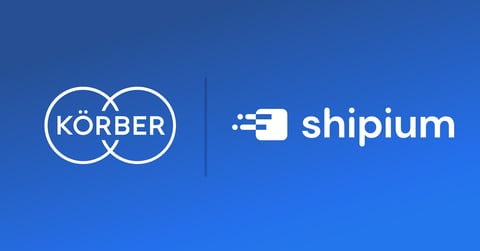Körber WMS: 7 Use Cases for Ecommerce Shipping Operations

Warehouses and processes for managing them are the backbone of fulfillment operations, ensuring products are stored safely, orders get handled smoothly, and customers receive their products as quickly as possible. That's why many ecommerce businesses rely on solutions like Körber's Warehouse Management System (WMS) to streamline workflows, strengthen operations, and elevate the customer experience.
Let’s review seven Körber WMS use cases across the full suite of options, like Core WMS, Extended WMS, Körber One, and HighJump, and explore how integrating it with a platform like Shipium can help businesses further optimize their shipping to reduce costs.
1. Streamlining warehouse processes
Without the proper technology, coordinating multiple tasks, maintaining accuracy, adapting to fluctuating demands, and minimizing errors can be challenging at a warehouse level.
With Körber WMS, optimizing complex ecommerce supply chains, whether managing one warehouse or several nationwide, becomes more straightforward. Here’s how:
- Leveraging advanced picking technologies: Implement voice-directed picking and RF scanning to enhance productivity and accuracy in order fulfillment.
- Designing layout and storage strategies: Analyze product characteristics, order patterns, and warehouse constraints to get suggestions for optimal slotting arrangements, minimizing travel time and maximizing space utilization.
- Unifying warehouse data: Gain a single source of truth for inventory, orders, and labor management, facilitating informed decision-making across the entire warehouse operation.
2. Improving inventory accuracy
You can't give your customers proper delivery estimates if you don't have systems to ensure accurate inventory levels. Especially in the case of multi-channel operations, poor inventory management can lead to stockouts, overselling, delayed shipments, and dissatisfied customers, which can all affect brand loyalty and sales.
Körber WMS helps improve stock management by:
- Delivering instantaneous inventory insights: Gain second-by-second visibility into stock levels, allowing for proactive replenishment and preventing stockouts.
- Supporting cycle counting: Facilitate various counting methods, including ABC analysis and dynamic cycle counting, ensuring ongoing inventory accuracy without disrupting daily operations.
- Implementing precise lot tracking: Enable detailed tracking of product lots, batches, and serial numbers, which is crucial for managing expiration dates, recalls, and compliance in industries with strict traceability requirements.
Integrating your Körber suite with a third-party shipping platform can improve your warehousing, helping position your products closer to potential buyers. For example, Shipium’s Inventory Placement tool works alongside native forecasting capabilities to recommend allocation options that balance delivery, speed, and cost, enabling better inventory management.
3. Enhancing customer service
When it comes to ecommerce, managing the customer journey is everything. In fact, a 2024 State of Customer Service and CX report sponsored by RingCentral revealed that 51% of US consumers rank service as more important than price.
A robust warehouse management system helps provide an optimal experience for every order by:
- Delivering live order status tracking: Keep customers informed with up-to-the-minute updates on orders, from picking to packing to shipping, reducing anxiety and support inquiries.
- Offering flexible delivery options: Enable different fulfillment methods, such as ship-from-store and click-and-collect, to meet diverse customer preferences and expectations.
- Managing value-added services: Handle special requests like gift wrapping or custom packaging, enhancing end-user satisfaction and allowing for personalization.
According to a 2023 report by VML, the average time shoppers globally expect to wait for online orders is 2.15 days, 8% quicker than in 2022. With speed being such a make-or-break factor in purchasing decisions, it’s more important than ever to set expectations before buying decisions and ensure you can meet them reliably without increasing costs.
Combining the capabilities of Shipium with Körber OMS, for example, allows you to leverage historical and real-time data to drive better pre-purchase delivery promises, helping boost conversion rates.
4. Simplifying returns management
Returns are a certainty in ecommerce. Case in point, the average return rate for ecommerce reached 17.6% in 2023, according to a report by the National Retail Federation. Poor returns handling can lead to customer frustration, discourage future sales, and waste resources at your warehouse, which can snowball into further complications in your fulfillment workflows.
Here’s how Körber WMS can manage this:
- Using automated RMA generation: Streamline returns by automatically creating Return Merchandise Authorizations based on predefined business rules, freeing resources and reducing potential errors.
- Facilitating quick item inspection: Easily guide warehouse staff through a structured inspection, ensuring consistent evaluation of returned items and appropriate disposition decisions.
- Providing analytics on return reasons: Collect and analyze data on returns, helping identify trends and implement strategies to reduce rates and improve customer satisfaction.
5. Reducing shipping expenses
Shipping is one of the most significant expenses that eat away profit margins for ecommerce brands, so reducing parcel spending remains an important focus. Using Körber software to manage your warehouse logistics helps you mitigate perpetually variable costs by:
- Optimizing cartonization: Calculate the most efficient packaging for each order, considering item dimensions, weight, and carrier requirements to improve profit margins and minimize material waste.
- Integrating multiple carriers: Support a mix of shipping providers, allowing you to compare rates, transit times, and service levels to select the most cost-effective options.
- Supporting zone skipping: Consolidate shipments to intermediate distribution points, reducing transit times and expenses for long-distance deliveries and multi-site operations.
Shipium bridges Körber OMS and WMS systems, helping you refine your fulfillment process further. It enhances the orchestration of your orders, from buy-now to delivered, improving speed and accuracy while reducing delivery expenses by at least 12%.
6. Scaling shipping operations for peak seasons
No matter the industry, peak seasons pose challenges for high-volume shippers, from managing increased demand on their warehouse workforce to balancing the higher-than-normal volumes of their carriers. Without lengthy timelines or increased development budget, Körber’s logistics make handling these fluctuations intuitive.
- Offering cloud-based deployment: Cloud infrastructure allows for rapidly scaling system resources during high-volume periods, ensuring consistent performance without significant hardware investments.
- Providing labor management tools: Workforce planning and task management features help optimize staff allocation and productivity during seasonal peaks or promotional events.
- Enabling quick onboarding: Intuitive user interfaces and role-based workflows facilitate rapid training and integration of temporary staff during busy periods.
Discover how Shipium Injection Shipping boosts peak season confidence for ecommerce businesses.
7. Managing multiple channels
Maintaining a consistent customer experience across multiple physical and online channels is demanding. If you don’t manage it properly, it can lead to confusion among customers and staff at the warehouse and store levels, directly affecting your bottom line.
Using a comprehensive tool like Körber streamlines channel management by:
- Simplifying omnichannel fulfillment: Unify your view of inventory across all sales channels, allowing for quicker shipment generation regardless of the order source.
- Allowing channel-specific picking and packing rules: Customize fulfillment for each sales channel, ensuring compliance with specific packaging or labeling requirements.
- Providing immediate multi-channel analytics: Access live dashboards showcasing performance metrics and transit data across all sales channels, enabling agile decision-making and rapid response to market shifts.
Optimize your supply chain using Körber software with Shipium
By integrating Shipium's end-to-end shipping tool with Körber's supply chain solutions, your business streamlines order management, warehouse activities, and logistics, resulting in faster, more accurate delivery promises — driving an average 12% reduction in total shipping spend.
Request a demo today and discover how Shipium helps Körber WMS users enhance performance and reduce bottom-line spending.
Frequently asked questions
What are the key benefits of integrating Körber WMS with a parcel optimization platform?
By connecting with a parcel optimization platform like Shipium, you can experience:
- Significant reduction in outbound shipping costs
- Faster and more accurate delivery promises to consumers
- Modernization and enhancement of shipping operations
- Improved coordination across previously disconnected steps of the supply chain
Which solutions in the Körber software suite can integrate with Shipium?
Shipium connects with everything from Körber One to the full suite of digital supply chain solutions — including the Order Management System (OMS) and Warehouse Management System (WMS).
Discover how Shipium and Körber improve supply chains.
How long does it take Körber supply chain customers to migrate their current parcel shipping system to the Shipium platform?
The average integration time to migrate legacy systems to Shipium is about two months per warehouse. We use a fast, agile integration with flexible APIs to ensure a smooth transition. Our goal is to get you up and running as quickly as possible so you can start seeing the benefits of our platform right away.
Explore how the Shipium integration works.

Diagonal thinker who enjoys hard problems of any variety. Currently employee #5 and the first business hire at Shipium, a Seattle startup founded by Amazon and Zulily vets to help ecommerce companies modernize their supply chains. Previously was CMO at Datica where I helped healthcare developers use the cloud. Prior to that I came up through product and engineering roles. In total, 18 years of experience leading marketing, product, sales, design, operations, and engineering initiatives within cloud-based technology companies.


